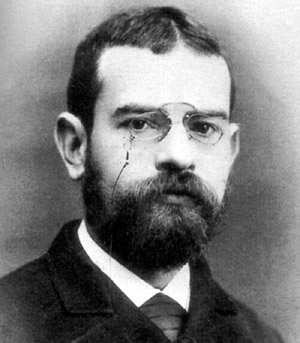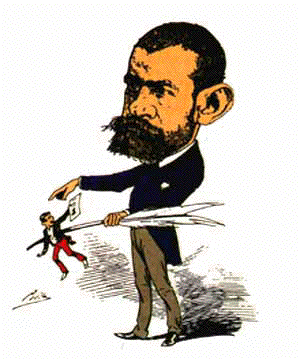
La Regenta by Leopoldo Alas: The critic, part one

Leopoldo Alas’ Wikipedia entry
In addition to La Regenta Leopoldo Alas only finished one other novel (His Only Son, which I plan to read soon) but wrote more than 80 short stories. I hope the short stories are some of the untranslated works Margaret Jull Costa will be working on in the near future.
Alas’ most famous role, though, may be as the literary critic “Clarín” (bugle). La Regenta is very much a work of criticism—the times, literature (including the theater), Spanish culture, and religion all provide large targets for Alas’ pen. Because of the importance of his role as critic I thought it worthwhile to explore his comments about novelistic standards and theories in his writings. I’m relying on Albert Brent’s dissertation Leopoldo Alas and La Regenta: A Study in Nineteenth Century Spanish Prose Fiction (see below for citation) for this post since I haven’t been able to find Alas’ critical writings translated into English.
From Brent’s opening of the chapter on novelistic theory:
Alas’ literary career may be considered to begin in 1875 when, on October 2nd, he used his subsequently famous pen name, Clarín, for the first time in signing an article for the Madrid paper, El Solfeo. Although there was not a great deal to indicate it at the time, that year might also be regarded as the real beginning of the rebirth of the novel in Spain. In that year Alarcón published El escándalo and Valera Las ilusiones del doctor Faustino. Pepita Jiménez had appeared the year before. Galdós had written his first novel five years earlier and was at work on the first two series of the Episodios nacionales. Pereda, Pardo Bazán, and Palacio Valdés had not yet produced their first novelistic work. Six years later, however, when Alas published his first collection of articles under the title Solos de Clarín (1881), the novel had begun in earnest. He wrote enthusiastically of this literary revival, which he spoke of as the “glorious renaissance” and “blessed restoration” of the Spanish novel. During the years following the Revolution of 1868, when liberalizing and revolutionary forces had initiated an era of freedom of thought and inquiry, when the national consciousness had been awakened and all spheres of intellectual life in Spain quickened, the novel had arisen as the literary vehicle best suited to disseminate “the fertile germ of contemporary life” and had become the most vigorous of the literary genres.
The extent to which their work reflected “modern life, the ideas of the times, the aspirations of the spirit of the present” was the chief criterion by which Alas judged the principal novelists at this time.
“There are two factions in the novel; here, in a field broader and more suited to battling [than the other literary genres], fight the past and the present, freedom and tradition.”
Galdós and Valera were the outstanding exponents of the “new Spanish novel” in Alas’ opinion, as well as the most gifted writers.
(page 11)
The choice of Galdós highlights Alas’ goal for the novel—to engage the public in order to improve Spanish life. As I touched on in the Torquemada novels and as we’ll see in Fortunata and Jacinta, Galdós doesn’t attack institutions or classes of people, rather he focuses on blindly following customs, ignoring social problems, and commonly practiced corruption. My exposure to Valera is limited so I’ll rely on Brent’s comments on that author:
In his subject matter, thought Alas, Valera was much more revolutionary than Galdós, but his influence as a novelist was less. The subtleties of thought in his novels, which made him the cherished writer of a select number, were too difficult for the average reader to penetrate. With unprecedented daring he had ventured into realms of the spirit never before revealed in Spanish literature; the discerning reader of Valera was made to think about, and read between the lines, things which a Spanish author had never before suggested.
(page 12)
Reactionary writers such as Alarcón and Pereda weren’t dismissed out of hand, rather they were judged on their artistic merit. If they made weak arguments on included banal irrelevancies, Alas criticized them while praising their excellence in descriptive writing. An influence (that was new to me) was the philosophy known as Krausism. See this article (pages 169-170: link dead) for some of the philosophy’s influence during this period in Spain. Brent goes into some detail on the philosophy’s overall influence and particularly on Alas:
As expounded and practiced by the generation of its followers to which Alas belonged, it was a liberalizing, reformative, energizing force, the influence of which was passed on to the Generation of ’98 and succeeding generations in Spain. It sought to awaken the nation from the apathetic state in which it lay at the time of the Revolution of 1868, to remedy its intellectual backwardness , and to destroy the forces of ignorance, intolerance, and the dogmatism that dominated it. It stood for freedom of thought, inquiry, and expression. It applied its doctrines to the schools, the church, and the state, in an effort to rid these institutions of their deleterious elements and to renovate and vivify them. … It is usually pointed out that Alas was never a real or very ardent Krausist, that his association with the movement was of relatively short duration, and that in time he even came to satirize certain figures and aspects connected with it, as in his unforgettable short story Zurita. While that is true as regards his attitude toward its popular and ephemeral manifestations and his affiliation therewith, he was keenly affected (to a degree not heretofore sufficiently recognized) by its basic philosophy and program of national rehabilitation with which he was in complete sympathy and accord. As his part in raising the cultural level of the country, he set out in his capacity as a critic to improve the quality of literary production. Although he frequently felt that his efforts were futile, he made it his life-long mission to champion the cause of good literature by being unafraid to speak the truth about what he considered good and what he judged bad. It is important to know these things in order to understand his ideas on literature and his criteria for evaluating the writers of his day.
(pages 15-16)
In the following quote (directly from Alas), he shows he values both a novel’s aesthetic value as well as its social importance. He understands that the author will project himself in his work but Alas desires to see “the soul seen from within”, not the writer’s opinion:
“I firmly believe that the formula of art for art’s sake is, to a certain extent, out-of-date, and that if it served excellently to combat didactic and, in part, tendentious literature, it is no longer useful in the face of the objectives of the new artistic generations, who reject, clearly, the thesis work, as this is understood, but who recognize that the positive, the real, the natural, must be, even more than in the artistic content, in the intent, and that this intent lives, and ought to live and must live in solidary existence with all the rest, which is the artist and poet besides. And to dispense with this is to deny the natural, the real, at the very point and moment when it matters most.
“When it is clear to me that a writer has ideas of his own and a lively and original feeling in regard to life’s most vital matters, I cannot say that the master works of that writer are ones in which I see nothing of what he thinks and feels about the things of highest interest.
“Observe that what is wanted is not the writer’s opinion, or rather, opinions; the writer is not required to uphold, even if done artistically, a cause, a religion, a philosophy, a political or social system, etc. This he may do or not do, according to his kind of inspiration, style, and temperament. But his ideas and concepts, his fellings and impressions, are not opinions; they are the soul seen from within; they are the outline of the make-up of a spirit that is part of the psychical reality of his time, country, race, communion, or whatever it may be.”
(pages 17-18)
Naturalism made inroads into Spain and Alas defended the new approach, although with some adjustments. It’s commonly mentioned that Spanish naturalism didn’t approach the same levels in certain areas as the brand practiced by someone like Zola. Alas confirms this watered-down approach by focusing on what naturalism should be, in particular focusing on the avoidance of ugly, base, and repugnant descriptions or images. As Brent puts it,
When he [Alas] spoke of naturalism and encouraged Spanish writers like Galdós and Pardo Bazán to follow its aims and methods, he was only advocating a broader novelistic approach to the depiction of life than had been practiced in Spain. It included the naturalistic technique of gathering and studying material, but it was actually no more than a Balzacian or Flaubertian realism.
(page 20)
Alas believed that novels could be beneficial for society, a possibility beginning to be tapped by authors like Galdós and maybe by his own example. By the time he wrote La Regenta he had a decade’s worth of experience in literary criticism over a rapidly changing landscape. Brent ends this section with a nice summarization from Alas’ own declarations and recommendations:
Perhaps nowhere is there to be found a more concise statement of what he considered the essence of the novel and the novelist’s method to be than in the following quotations:
“…I believe that the novel is the complete history of every event of moment, the only difference, strictly speaking, between history and the novel being the intention for which they are written, not the end result, which for both is truth as to the facts.”
The second is the advice that he gave to the young novelist Ortega Munilla:
“…study, then, even more than [literary] models, life: draw from its depths your plots, wrestle in art for some idea, as the artist should wrestle, with the beautiful…”
In short, then, Alas conceived of the novel as a vital and meaningful expression of the manners and problems of contemporary life; at the same time, he saw it as a work of art, the esthetic qualities of which transcended the historical element to give it a universality and lasting value in the realm of literary creation.
(page 22)
I think these points are important because they outline some of the core principals about the novel Alas held as he worked on his own contribution. They also give a good guideline on judging La Regenta–how successful was he in achieving these goals?
More on La Regenta when I return next week…
Note: All quotes come from Brent, Albert. 1951. Leopoldo Alas and La Regenta: A Study in Nineteenth Century Spanish Prose Fiction. Columbia: Curators of the University of Missouri.

Picture source
seraillon
That's a great line about the novel and history. And yes, the Alas translation by Jull Costa will be short stories.
Dwight
All right! I look forward to her translation…supposedly he has some very fine short stories. I'm looking forward to his other novel, hopefully after Galdos. First I need to get out of the way of a tropical depression…